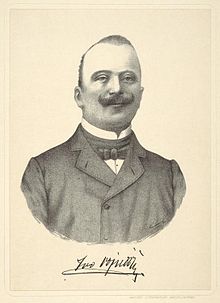Ivo Vojnović
Ivo Vojnović (born October 9, 1857 in Dubrovnik , † August 30, 1929 in Belgrade ) was a poet and playwright of Serbian and Croatian modernism .
Life
Shortly after his birth, the family moved to Split , where he completed four years of elementary school and seven years of high school. Since his father Kosta, a lawyer by profession, got a job at the University of Zagreb , which was just opened , he graduated from high school in Zagreb, where he was also awarded the title of qualified lawyer in 1879. After graduating, he worked as a court person in Zagreb, Križevci , Bjelovar , Zadar and Dubrovnik. He was also the head of the district in Supetar , but in 1907 he was fired because of a financial affair with no entitlement to an old-age pension. In the same year he became the dramaturge ofCroatian National Theater in Zagreb and also published the first Croatian theater journal ( Hrvatska pozornica , German Croatian stage). During World War I , Vojnović, a professional writer since 1911, was sentenced as a Yugoslav nationalist but served most of the sentence in hospital. Since then, his eyesight has deteriorated so that he was almost blind until his death. After the end of the war until his death he lived in Nice , Dubrovnik and Belgrade .
Act
He made his literary debut, the short story Geranium , in Vijenac in 1880 . This was followed by the prose collection Perom i olovkom (1884) and the short story Ksanta (1886), which made Vojnović a pioneer of modernity because of their psychological and symbolic elements. His lyrical opus is by no means extensive, but his collection Lapadski soneti (1892) is one of the most important sonnet cycles in Croatian literature. The main characteristics of this poetry are form closure, melancholy and local motifs. Since the appearance of his first comedy ( Psyche , 1889), for which he was awarded the Matica Hrvatska Prize, he has worked almost exclusively as a playwright. In 1893 his occasional piece Gundulićev san appeared on the occasion of the unveiling of a monument to Ivan Gundulić in Dubrovnik. In his most famous dramas Ekvonocijo (1895) and Dubrovačka trilogija (1903) he brings everyday life in Dubrovnik to the stage and shows the lives of those who are gradually disappearing in the present. The interweaving of symbolism and naturalism , the Dubrovnik dialect, emphasized symbolism of the ambience and the absence of pathetic and declamatory skills are just some of the characteristics of his works, the appearance of which has enriched the Croatian repertoire, saturated with domestic and foreign comedies, and pointed Croatian drama production in a new direction .
List of works
prose
- Geranium (1880)
- Perom i olovkom (German with pen and pencil, 1884)
- Ksanta (1886)
Poetry
- Lapadski soneti (German Lapad sonnets, 1892)
drama
- Psyche (1889)
- Gundulićev san (Eng.Gundulić's dream, 1893)
- Ekvinocijo (German equinox, 1895)
-
Dubrovačka trilogija (Eng. The Ragusaner Trilogy, 1902)
- Allons Enfants !
- Suton (dt. Twilight)
- Na taraci ( Eng . On the terrace)
- Smrt majke Jugovića (German death of the Jugović mother, 1907)
- Lazarovo vaskrsenje (German Resurrection of Lazar, 1913)
- Prologue nenapisane drame (German prologue to an unwritten drama, 1929)
Web links
| personal data | |
|---|---|
| SURNAME | Vojnović, Ivo |
| BRIEF DESCRIPTION | Poet and playwright |
| DATE OF BIRTH | October 9, 1857 |
| PLACE OF BIRTH | Dubrovnik |
| DATE OF DEATH | August 30, 1929 |
| Place of death | Belgrade |
